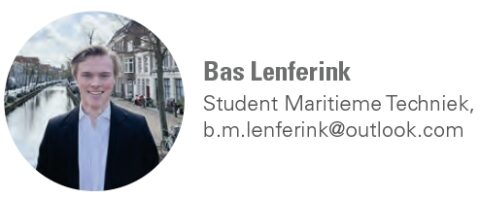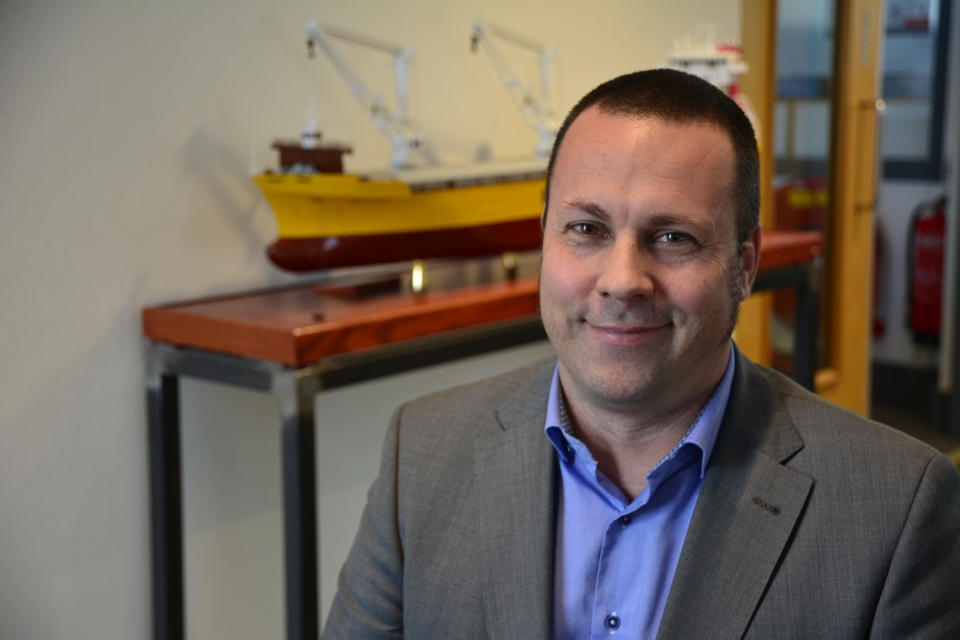The curriculum of the Bachelor’s degree programme of Marine Technology at the Delft University of Technology (TU Delft), i.e. all the material and knowledge that a student must master at the end of the programme, is being revised. Subjects will be adjusted and changes in sector and society will be taken into account. An interview with the Bachelor’s programme director Jeroen Pruyn.
For SWZ|Maritime’s May education special, SWZ’s editor and TU Delft student Bas Lenferink discussed the review of the TU Delft’s Bachelor’s degree programme of Marine Technology with the Bachelor’s programme director Jeroen Pruyn. Subscribers can read the entire May issue in our Archive.
‘A study is always in evolution. The revision makes it possible to reflect on this and set a course for the coming years,’ says Pruyn (pictured above). What does all this mean? Do companies in the sector have much influence, or are social developments more important?
Every six years, the contant of the TU Delft Bachelor’s degree programme is assessed and adjusted. All the material and knowledge is divided into subjects, which in turn are interconnected. Mathematics and physics are an important basis of the programme. The different maritime courses build on these. They deal with the application of mathematics and physics in the maritime world and in the design of a ship.
Also read: TU Delft launches Floating Renewables Lab to boost floating offshore wind
What is broadly going to change?
‘There are two main goals,’ says Pruyn. ‘The first is to improve the time it takes to complete the study programme. Currently, around forty to fifty per cent of students pass the binding study advice (BSA). This concerns about 45 academic credits that you have to obtain in the first year to be able to continue. This percentage should be increased to seventy. The emphasis is on maintaining quality, while removing obstacles as much as possible.’
For this purpose, a study choice check will help prospective students. ‘There are always people who drop out, because they were wrong about the study, or find it too difficult. Such a check will make that group smaller.’ The check will mean that fewer people will start with the programme, which will increase the yield in the first year.
More attention is also paid to completing the bachelor’s programme in four, which should actually be three, years. ‘That is our aim. This means that more attention goes to the way students learn through mentoring and similar ways. This will not be a course on learning to learn, but reflecting to take a good look at one’s own way of working. So that a student realises in time that a lot has to be done,’ says Pruyn.
‘The second goal is to better embed design, sustainability and skills in the curriculum. In those areas, the curriculum is really being renewed. Design is clearly in the curriculum, because every year ends with a design subject. Sustainability is present, but could be more clearly expressed, perhaps in a combination with ethics. Skills are also present, but rigidly organised. When, for instance, the teaching of reporting is completed, no further attention is paid to it. Students often work together in the same group and fulfil the same roles. As a result, everyone remains stuck in their own role and other skills are less developed.
What influences the adaptation of a subject?
Pruyn: ‘The most important angle of approach comes from our own scientific research. We do that together with companies and the sector. This makes the research relevant to what needs to be taught. We are all researchers and we like to tell people what we are doing. This is how research is eventually given a place in the Bachelor’s programme. This happens quite naturally. The revision just puts extra emphasis on it.’
‘The current subjects were revised in 2013 and in terms of content they are still the same. They are only taught differently. As far as possible, a lecturer will always adapt a subject to current events. Assignments will also change and tests may be different. This is done on the basis of experience from previous years. Nevertheless, it is a good idea to revise subjects properly with some regularity. Covid-19 has postponed it, because everyone was too busy keeping their heads above water.’
Every five years, there is also an educational review, which looks at how relevant the Bachelor’s final attainment levels are. ‘The final attainment levels are always discussed with the professional field, through a committee consisting of people from the business community. The first draft of the bachelor’s revision is also discussed extensively with this committee. In this case, I do not expect any major problems, because we are not rigorously changing the contents of the study.’
‘The technical content is the basis of our education, but if you ask someone years after graduating what he learned, it’s never “integrate mathematically using Euler’s method”. He will always say that he learned to organise or to think critically. The personal qualities are often much more important. These qualities, based on a good technical basis, are what make a Delft engineer a Delft engineer and different from a foreign engineer or someone from another Dutch university.
Also read: VIDEO: TU Delft Hydro Motion Team reveals latest hydrofoil hydrogen boat
How is the Delft engineer different from others?
‘One of the things we get back is that we train engineers who know how to get things done. Who are quite used to dealing with a lot of work. Whereas with other studies this sometimes only happens in the field and students have it easier until then. Critical thinking skills are also very important. That is a group process; half of the teachers were trained in Delft, think like that and pass it on. Critical thinking is really a goal. You are only really challenged if you develop it in your Bachelor’s programme and not only in the master’s.’
‘In design projects during the bachelor, students mainly learn to weigh up, think critically and combine. They have already acquired the substantive knowledge in other subjects. Designing means looking at all the requirements and combining them, so you have to train that as well. It contains a lot of material and the students can develop themselves. It can’t do any harm to have students read more papers and look things up. Sustainability is a good topic for this. It has to remain interesting and thinking about sustainability is still developing. A lot of knowledge comes from papers now. You don’t have to know everything, as long as you know what to look for and what to store.’
‘The question remains: what exactly is sustainable? Do we look at CO2 emissions or also at other substances? Ultimately, the question is what is acceptable. The student learns to think about this himself, that is the only option. The biggest mistake you can make is to believe in something with your eyes closed and no longer be open to discussion and arguments. Sustainability also lends itself very well to ethics. Developments come very quickly and there is no book that prescribes the best choice.’
Do major developments in the world have an influence, not directly on the study, but on the attitude of the university?
‘Yes, but that applies in general. I think the world is hardening and a war doesn’t help. And Europe has few natural resources. Where are rare metals going to come from? It is not without reason that deep sea mining is being developed. There is also a risk in the area of natural gas, because where should it come from and what do we want? Maritime engineers are not going to solve that directly, but it can influence which energy we will generate and how we will think about nuclear energy, for example. That, in turn, can influence how we think about ship propulsion. I think it can do no harm to make room in the Bachelor’s programme for thinking about such matters. The maritime sector does not operate in isolation and changes in the market can have major consequences for the design and production of ships.’
Picture (top): Director Jeroen Pruyn: ‘Better embedding of design, sustainability and skills’.
This article was written by:









